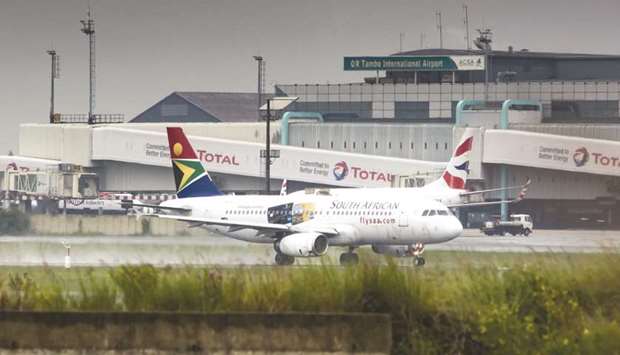Africa is slowly opening up for international air travel although many nations in the continent still face a difficult choice as Covid-19 infections are rapidly rising.
Several countries in Africa depend significantly on international tourism to balance their budget, and have already been hit because of the pandemic.
South Africa, the continent’s most developed economy, is struggling to provide care for Covid-19 patients.
Like other countries around the globe, Covid-19 lockdowns have led to an almost complete standstill in airline travel in the continent. Many airlines have grounded their flights, around Africa.
Most of Africa’s 54 countries closed their airspace to ward off the pandemic. That bought time to prepare, but it also hurt efforts to deliver life-saving medical supplies such as vaccines against other diseases, according to the Associated Press.
Shipments of personal protective gear and coronavirus testing materials, both in short supply, have been delayed.
Many African governments acted swiftly, implementing confinement and travel restrictions in the early days of the pandemic.
In the African region that is served by the World Health Organisation (WHO), some 36 countries had closed their borders to international travel, eight suspended flights from countries with high Covid-19 transmission and others had partial or no restrictions.
So far, Cameroon, Equatorial Guinea, Tanzania and Zambia have resumed commercial flights.
The 15-member Economic Community of West African States (ECOWAS) – a regional political and economic union – is expected to open their airspace on July 21. While open borders are vital for the free flow of goods and people, initial analysis by WHO found that lockdowns along with public health measures reduced the spread of Covid-19.
Even with border restrictions, imported cases have sometimes brought back Covid-19 to countries, which had not reported cases for a length of time.
For example, Seychelles had not had a locally transmitted case since April 6, but in the last week of June, some 66 new cases – all crew members of an international fishing vessel – were recorded.
“Air travel is vital to the economic health of countries,” points out Dr Matshidiso Moeti, WHO regional director for Africa.
“But as we take to the skies again, we cannot let our guard down. Our new normal still requires stringent measures to stem the spread of Covid-19,” she said.
Regional leaders of the International Air Transport Association and Airports Council International are ready to go in terms of commercial aviation in the continent.
In an open letter to African ministers last month, they welcomed global guidelines developed by the ICAO for the return to travel after the aviation industry’s “biggest challenge of its history.
They also urged African countries to “identify every opportunity where travel restrictions could be lifted ... as soon as the epidemiological situation allows for it.” Africa may not be able to further delay resumption of international flights because it faces the first recession in a quarter-century and has lost nearly $55bn in the travel and tourism sectors in the past three months, according to the African Union.
Airlines alone have lost about $8bn and some may not even survive, analysts say.
The impact of Covid-19 on airlines is likely to be even worse. African airlines could lose another $6bn of passenger revenue compared to 2019 and job losses in aviation and related industries could grow to 3.1mn, half of the region’s 6.2mn aviation-related employment, according to the International Air Transport Association (IATA).
In the worst-case scenario, international air traffic in Africa could see a 69% drop in international traffic capacity and 59% decline in domestic capacity, according to an analysis by the International Civil Aviation Organisation (ICAO).
Meanwhile, to resume international air travel, WHO has recommended that countries assess the epidemiological situation to determine whether maintaining restrictions outweighs the economic costs of reopening borders if, for instance, there is widespread transmission of the virus.
It is also crucial to determine whether the health system can cope with a spike in imported cases and whether the surveillance and contact tracing system can reliably detect and monitor cases.
It is important that countries have systems in place at points of entry including airports. Comprehensive entry and exit screening should be considered based on risk assessment and cost-benefit analysis, and as part of the overall national response strategy.
Such screening may target, as a priority, direct flights from areas with community transmission.
In addition, observance of preventive measures such as personal hygiene, cough etiquette, physical distancing remains crucial. Passengers should be registered and followed up, and if they develop symptoms be advised to inform health authorities.
“The resumption of commercial flights in Africa will facilitate the delivery of crucial supplies such as testing kits, personal protective equipment and other essential health commodities to areas, which need them most,” Dr Moeti stressed.
“It will also ensure that experts, who can support the response can finally get on the ground and work,” the Botswanan doctor and public health specialist noted.
Therefore, it is crucial that African governments take effective measures to mitigate the risk of a surge in infections following the resumption of commercial flights and airport operations in the continent.
* Pratap John is Business Editor at Gulf Times. Twitter handle: @PratapJohn

An Airbus A320-200 passenger jet, operated by South African Airlines, taxis at OR Tambo International Airport in Johannesburg. Africa is slowly opening up for international air travel although many nations in the continent still face a difficult choice as Covid-19 infections are rapidly rising.

